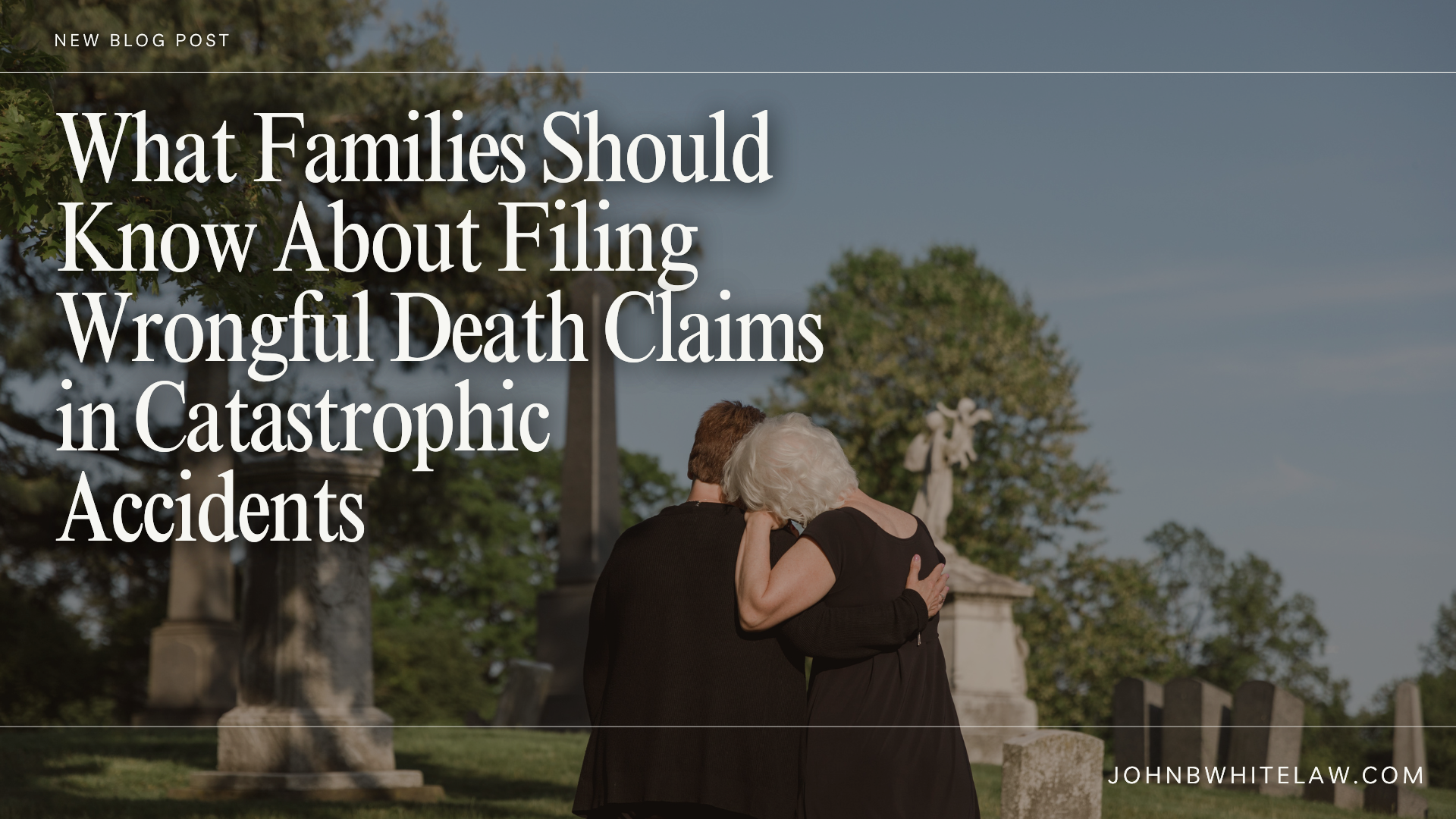What Families Should Know About Filing Wrongful Death Claims in Catastrophic Accidents
Catastrophic accidents bring unimaginable pain and loss, especially when they result in the tragic death of a loved one. At John B. White Jr., P.A., we understand the profound emotional and financial challenges families face during these times. For many, filing a wrongful death claim can provide not only a sense of justice but also vital support for those left behind. However, understanding the process and knowing what to expect can make a significant difference in the outcome of your case. Here’s a comprehensive guide for families considering filing a wrongful death claim after a catastrophic accident.
1. Understanding What a Wrongful Death Claim Entails
A wrongful death claim is a civil action filed by the surviving family members or the estate of a deceased person whose death was caused by the negligence, recklessness, or intentional actions of another party. Unlike criminal cases, which aim to punish wrongdoers, wrongful death claims are designed to compensate the family for their losses and ensure the liable party is held accountable for their actions. These claims can arise from various catastrophic accidents, such as motor vehicle crashes, workplace accidents, medical malpractice, or accidents involving defective products.
2. Who Can File a Wrongful Death Claim?
Each state has laws specifying who is eligible to file a wrongful death claim. In South Carolina, the claim is typically brought by the executor or administrator of the deceased person’s estate on behalf of the surviving family members. The law prioritizes certain family members, such as spouses, children, or parents, in receiving any financial recovery. If you’re uncertain about who can file the claim or are unsure of your role in the process, consulting an experienced wrongful death attorney can provide much-needed clarity.
3. Proving Liability in a Wrongful Death Case
For a wrongful death claim to succeed, it’s essential to prove that another party’s negligence or intentional act led to your loved one’s fatal accident. This typically involves four critical components:
- Duty of Care: Demonstrating that the defendant had a duty to act safely or responsibly to prevent harm.
- Breach of Duty: Showing that the defendant failed to fulfill their duty, whether through negligent driving, unsafe work conditions, or other actions.
- Causation: Establishing that the breach of duty directly caused the accident leading to your loved one’s death.
- Damages: Providing evidence of the financial and emotional losses suffered due to the death.
Proving these elements often requires substantial evidence, including accident reports, witness statements, expert testimonies, and medical records. An experienced attorney will know how to gather and present the evidence needed to build a strong case.
4. The Types of Damages Families Can Recover
In a wrongful death case, the damages awarded can provide financial relief and acknowledge the emotional toll of the loss. In South Carolina, recoverable damages generally include:
- Economic Damages: These compensate for quantifiable losses, such as medical bills, funeral expenses, and lost wages that the deceased would have earned.
- Non-Economic Damages: These cover intangible losses, including pain and suffering, loss of companionship, and mental anguish. They aim to recognize the emotional void left by the loss.
- Punitive Damages: In cases where the defendant’s actions were particularly reckless or intentional, punitive damages may be awarded to penalize the wrongdoer and deter similar behavior in the future.
Each case is unique, and working with a skilled attorney can help that you pursue the full extent of compensation available to you.
5. Statute of Limitations: Timing is Critical
South Carolina law imposes a strict statute of limitations on wrongful death claims. Generally, you have three years from the date of your loved one’s death to file the claim. Missing this deadline can result in losing your right to seek compensation. Given the emotional difficulty of pursuing legal action during a period of grief, consulting an attorney as soon as possible can help you avoid these critical timing issues.
6. How an John B. White Jr. P.A. Can Help
Navigating a wrongful death claim can be overwhelming, especially while dealing with grief. A knowledgeable attorney will handle every legal aspect of the case, from conducting thorough investigations to gathering evidence, negotiating with insurance companies, and representing you in court if necessary. John B. White Jr. P.A. provides compassionate guidance, helping you make informed decisions that honor your loved one’s memory while protecting your family’s future.
7. Emotional Challenges and Finding Support
Filing a wrongful death claim involves reliving painful memories and facing complex legal issues. While financial compensation can offer stability, emotional healing is an essential part of the journey. Support groups, counseling, and a strong community of family and friends can make a difference as you move forward. At John B. White Jr., P.A., we aim to be a source of support and strength during this process, making sure that you and your family feel supported every step of the way.
Filing a wrongful death claim in the aftermath of a catastrophic accident is a challenging yet potentially essential step toward securing justice and financial stability for your family. By understanding your rights, the steps involved, and the support available, you can approach this process with clarity and confidence. At John B. White Jr., P.A., our dedicated team of experienced attorneys is here to guide you with compassion, We help to make sure your loved one’s legacy is honored and your family’s future is protected.

